Analyzing Lease vs. License in UK Law: Street v Mountford Case Study
VerifiedAdded on 2020/10/23
|10
|2904
|175
Report
AI Summary
This report provides a comprehensive comparison between leases and licenses within the context of UK property law. It begins by defining both terms, highlighting that a lease creates a legal interest in land with exclusive possession, while a license grants mere permission without creating such an interest. The report then delves into the legal aspects of each, emphasizing the importance of exclusive possession, a fixed term, and rent for establishing a lease. It examines the landmark case of Street v. Mountford [1985], where the House of Lords clarified the distinction between the two. The report critically evaluates the essential elements of a lease and license, particularly focusing on exclusive possession and the court's role in determining the true nature of agreements, even if disguised. Various case laws are discussed to support the analysis and to distinguish the rights of tenants and licensees. The conclusion summarizes the key differences and the significance of the Street v Mountford case in clarifying the legal status of rental agreements, emphasizing the court's authority to determine the true nature of agreements based on their substance, not just their form.
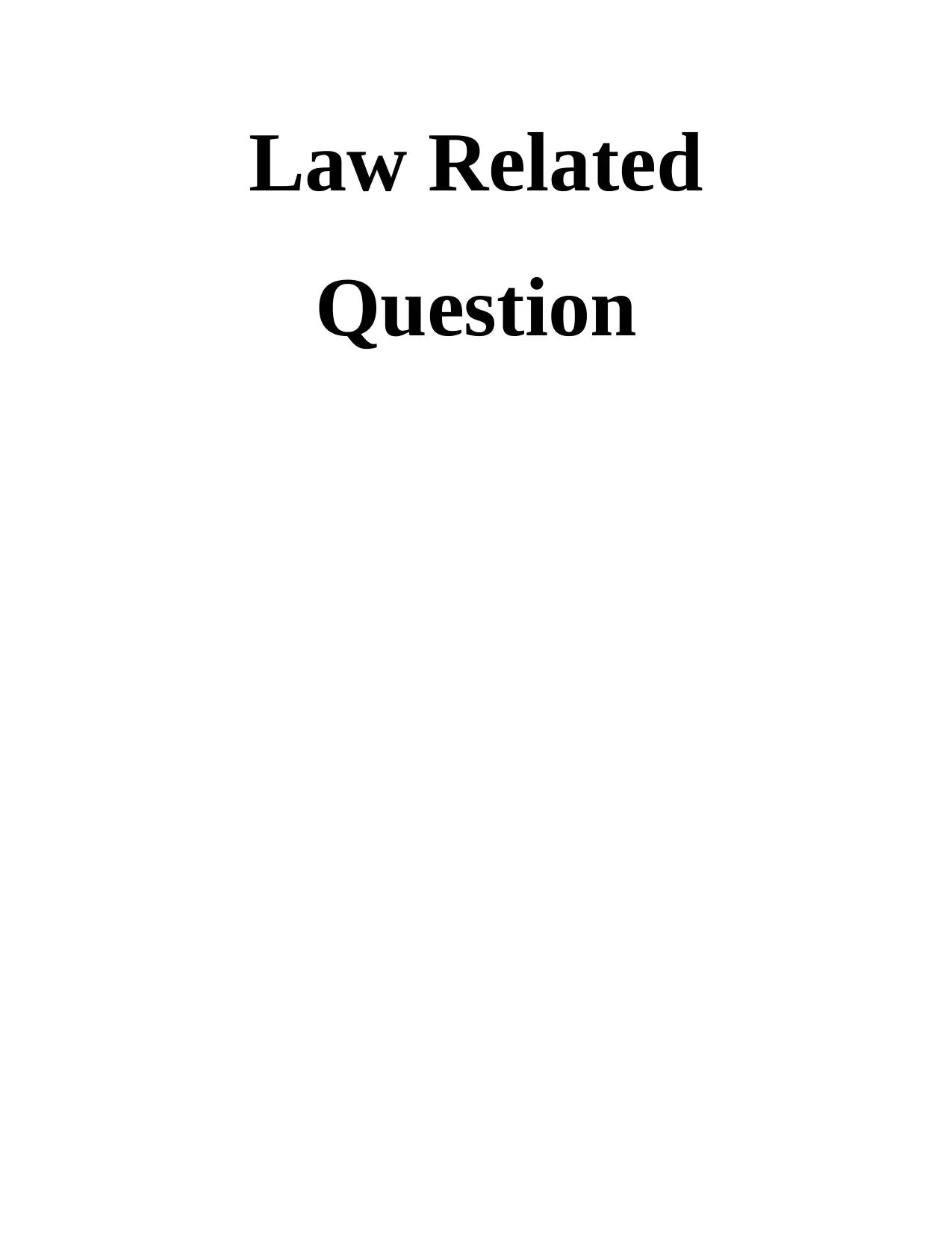
Law Related
Question
Question
Paraphrase This Document
Need a fresh take? Get an instant paraphrase of this document with our AI Paraphraser
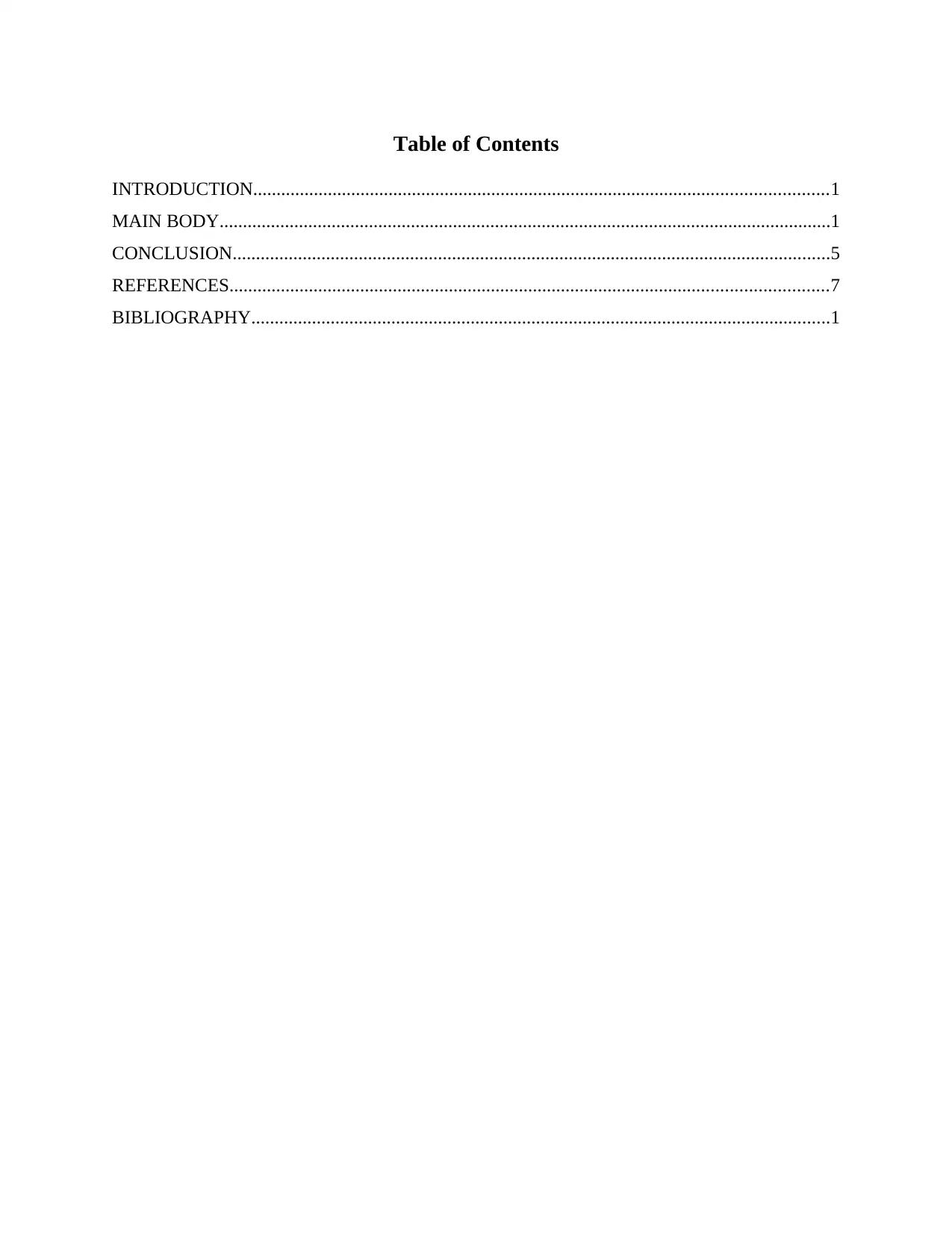
Table of Contents
INTRODUCTION...........................................................................................................................1
MAIN BODY...................................................................................................................................1
CONCLUSION................................................................................................................................5
REFERENCES................................................................................................................................7
BIBLIOGRAPHY............................................................................................................................1
INTRODUCTION...........................................................................................................................1
MAIN BODY...................................................................................................................................1
CONCLUSION................................................................................................................................5
REFERENCES................................................................................................................................7
BIBLIOGRAPHY............................................................................................................................1
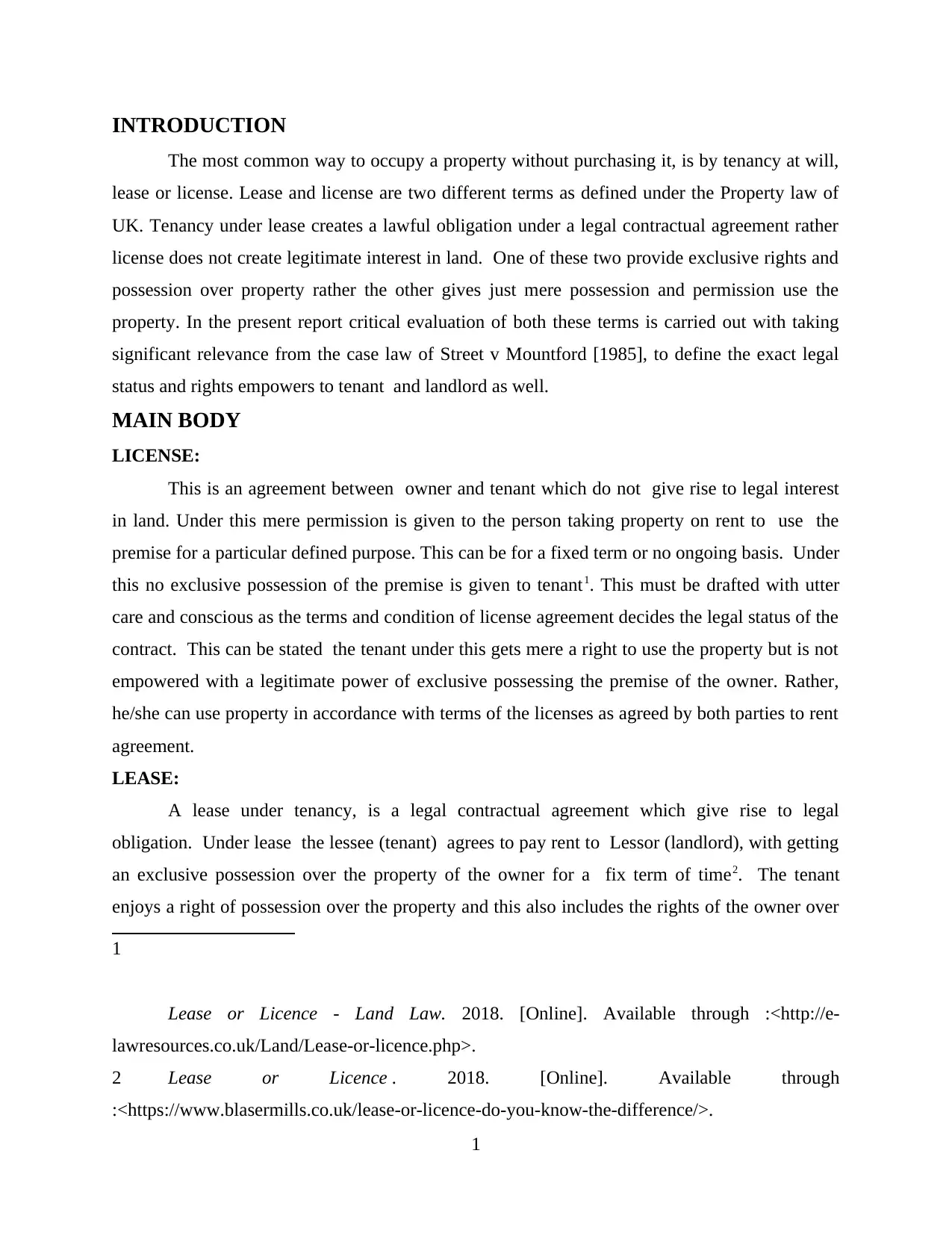
INTRODUCTION
The most common way to occupy a property without purchasing it, is by tenancy at will,
lease or license. Lease and license are two different terms as defined under the Property law of
UK. Tenancy under lease creates a lawful obligation under a legal contractual agreement rather
license does not create legitimate interest in land. One of these two provide exclusive rights and
possession over property rather the other gives just mere possession and permission use the
property. In the present report critical evaluation of both these terms is carried out with taking
significant relevance from the case law of Street v Mountford [1985], to define the exact legal
status and rights empowers to tenant and landlord as well.
MAIN BODY
LICENSE:
This is an agreement between owner and tenant which do not give rise to legal interest
in land. Under this mere permission is given to the person taking property on rent to use the
premise for a particular defined purpose. This can be for a fixed term or no ongoing basis. Under
this no exclusive possession of the premise is given to tenant1. This must be drafted with utter
care and conscious as the terms and condition of license agreement decides the legal status of the
contract. This can be stated the tenant under this gets mere a right to use the property but is not
empowered with a legitimate power of exclusive possessing the premise of the owner. Rather,
he/she can use property in accordance with terms of the licenses as agreed by both parties to rent
agreement.
LEASE:
A lease under tenancy, is a legal contractual agreement which give rise to legal
obligation. Under lease the lessee (tenant) agrees to pay rent to Lessor (landlord), with getting
an exclusive possession over the property of the owner for a fix term of time2. The tenant
enjoys a right of possession over the property and this also includes the rights of the owner over
1
Lease or Licence - Land Law. 2018. [Online]. Available through :<http://e-
lawresources.co.uk/Land/Lease-or-licence.php>.
2 Lease or Licence . 2018. [Online]. Available through
:<https://www.blasermills.co.uk/lease-or-licence-do-you-know-the-difference/>.
1
The most common way to occupy a property without purchasing it, is by tenancy at will,
lease or license. Lease and license are two different terms as defined under the Property law of
UK. Tenancy under lease creates a lawful obligation under a legal contractual agreement rather
license does not create legitimate interest in land. One of these two provide exclusive rights and
possession over property rather the other gives just mere possession and permission use the
property. In the present report critical evaluation of both these terms is carried out with taking
significant relevance from the case law of Street v Mountford [1985], to define the exact legal
status and rights empowers to tenant and landlord as well.
MAIN BODY
LICENSE:
This is an agreement between owner and tenant which do not give rise to legal interest
in land. Under this mere permission is given to the person taking property on rent to use the
premise for a particular defined purpose. This can be for a fixed term or no ongoing basis. Under
this no exclusive possession of the premise is given to tenant1. This must be drafted with utter
care and conscious as the terms and condition of license agreement decides the legal status of the
contract. This can be stated the tenant under this gets mere a right to use the property but is not
empowered with a legitimate power of exclusive possessing the premise of the owner. Rather,
he/she can use property in accordance with terms of the licenses as agreed by both parties to rent
agreement.
LEASE:
A lease under tenancy, is a legal contractual agreement which give rise to legal
obligation. Under lease the lessee (tenant) agrees to pay rent to Lessor (landlord), with getting
an exclusive possession over the property of the owner for a fix term of time2. The tenant
enjoys a right of possession over the property and this also includes the rights of the owner over
1
Lease or Licence - Land Law. 2018. [Online]. Available through :<http://e-
lawresources.co.uk/Land/Lease-or-licence.php>.
2 Lease or Licence . 2018. [Online]. Available through
:<https://www.blasermills.co.uk/lease-or-licence-do-you-know-the-difference/>.
1
⊘ This is a preview!⊘
Do you want full access?
Subscribe today to unlock all pages.

Trusted by 1+ million students worldwide
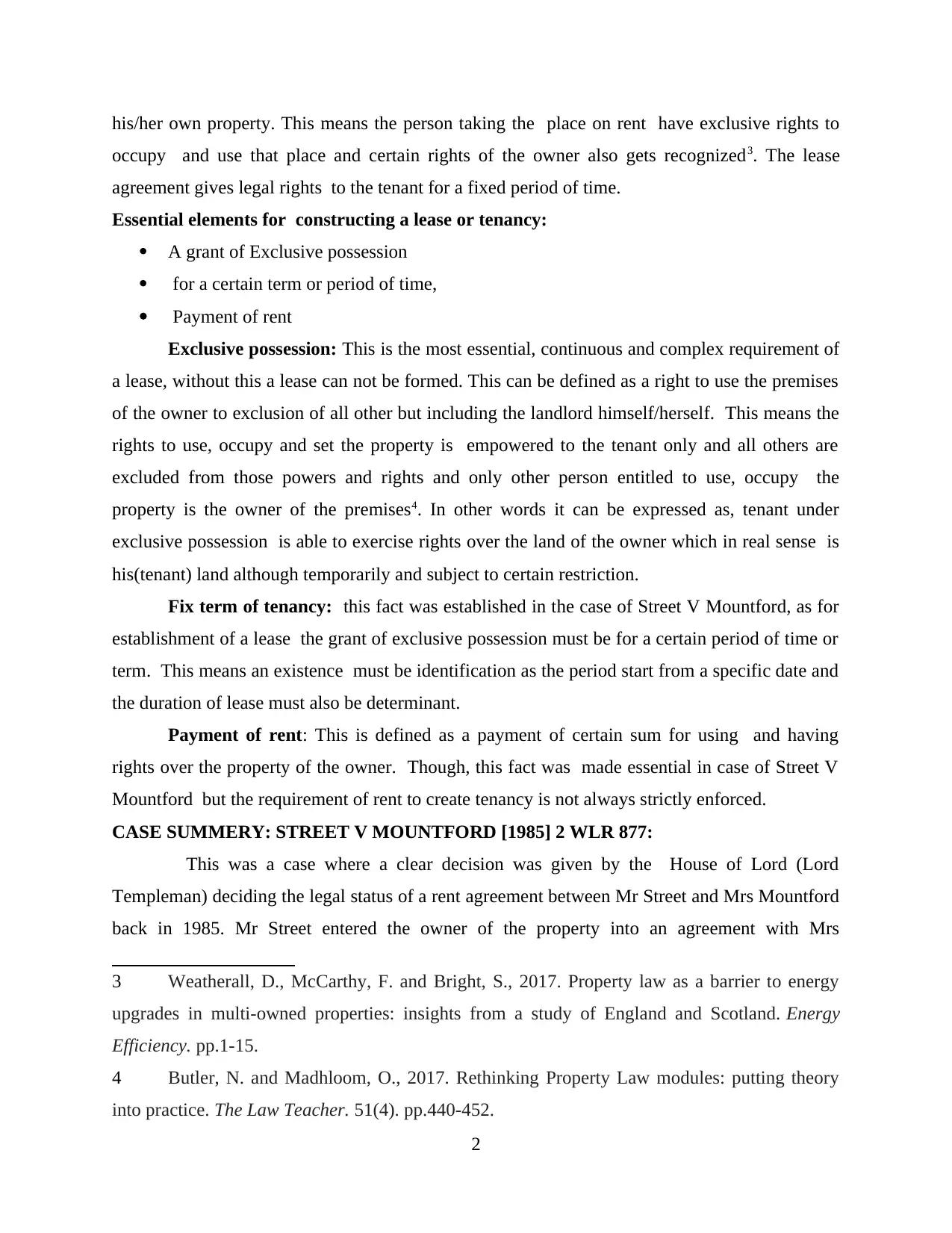
his/her own property. This means the person taking the place on rent have exclusive rights to
occupy and use that place and certain rights of the owner also gets recognized3. The lease
agreement gives legal rights to the tenant for a fixed period of time.
Essential elements for constructing a lease or tenancy:
A grant of Exclusive possession
for a certain term or period of time,
Payment of rent
Exclusive possession: This is the most essential, continuous and complex requirement of
a lease, without this a lease can not be formed. This can be defined as a right to use the premises
of the owner to exclusion of all other but including the landlord himself/herself. This means the
rights to use, occupy and set the property is empowered to the tenant only and all others are
excluded from those powers and rights and only other person entitled to use, occupy the
property is the owner of the premises4. In other words it can be expressed as, tenant under
exclusive possession is able to exercise rights over the land of the owner which in real sense is
his(tenant) land although temporarily and subject to certain restriction.
Fix term of tenancy: this fact was established in the case of Street V Mountford, as for
establishment of a lease the grant of exclusive possession must be for a certain period of time or
term. This means an existence must be identification as the period start from a specific date and
the duration of lease must also be determinant.
Payment of rent: This is defined as a payment of certain sum for using and having
rights over the property of the owner. Though, this fact was made essential in case of Street V
Mountford but the requirement of rent to create tenancy is not always strictly enforced.
CASE SUMMERY: STREET V MOUNTFORD [1985] 2 WLR 877:
This was a case where a clear decision was given by the House of Lord (Lord
Templeman) deciding the legal status of a rent agreement between Mr Street and Mrs Mountford
back in 1985. Mr Street entered the owner of the property into an agreement with Mrs
3 Weatherall, D., McCarthy, F. and Bright, S., 2017. Property law as a barrier to energy
upgrades in multi-owned properties: insights from a study of England and Scotland. Energy
Efficiency. pp.1-15.
4 Butler, N. and Madhloom, O., 2017. Rethinking Property Law modules: putting theory
into practice. The Law Teacher. 51(4). pp.440-452.
2
occupy and use that place and certain rights of the owner also gets recognized3. The lease
agreement gives legal rights to the tenant for a fixed period of time.
Essential elements for constructing a lease or tenancy:
A grant of Exclusive possession
for a certain term or period of time,
Payment of rent
Exclusive possession: This is the most essential, continuous and complex requirement of
a lease, without this a lease can not be formed. This can be defined as a right to use the premises
of the owner to exclusion of all other but including the landlord himself/herself. This means the
rights to use, occupy and set the property is empowered to the tenant only and all others are
excluded from those powers and rights and only other person entitled to use, occupy the
property is the owner of the premises4. In other words it can be expressed as, tenant under
exclusive possession is able to exercise rights over the land of the owner which in real sense is
his(tenant) land although temporarily and subject to certain restriction.
Fix term of tenancy: this fact was established in the case of Street V Mountford, as for
establishment of a lease the grant of exclusive possession must be for a certain period of time or
term. This means an existence must be identification as the period start from a specific date and
the duration of lease must also be determinant.
Payment of rent: This is defined as a payment of certain sum for using and having
rights over the property of the owner. Though, this fact was made essential in case of Street V
Mountford but the requirement of rent to create tenancy is not always strictly enforced.
CASE SUMMERY: STREET V MOUNTFORD [1985] 2 WLR 877:
This was a case where a clear decision was given by the House of Lord (Lord
Templeman) deciding the legal status of a rent agreement between Mr Street and Mrs Mountford
back in 1985. Mr Street entered the owner of the property into an agreement with Mrs
3 Weatherall, D., McCarthy, F. and Bright, S., 2017. Property law as a barrier to energy
upgrades in multi-owned properties: insights from a study of England and Scotland. Energy
Efficiency. pp.1-15.
4 Butler, N. and Madhloom, O., 2017. Rethinking Property Law modules: putting theory
into practice. The Law Teacher. 51(4). pp.440-452.
2
Paraphrase This Document
Need a fresh take? Get an instant paraphrase of this document with our AI Paraphraser
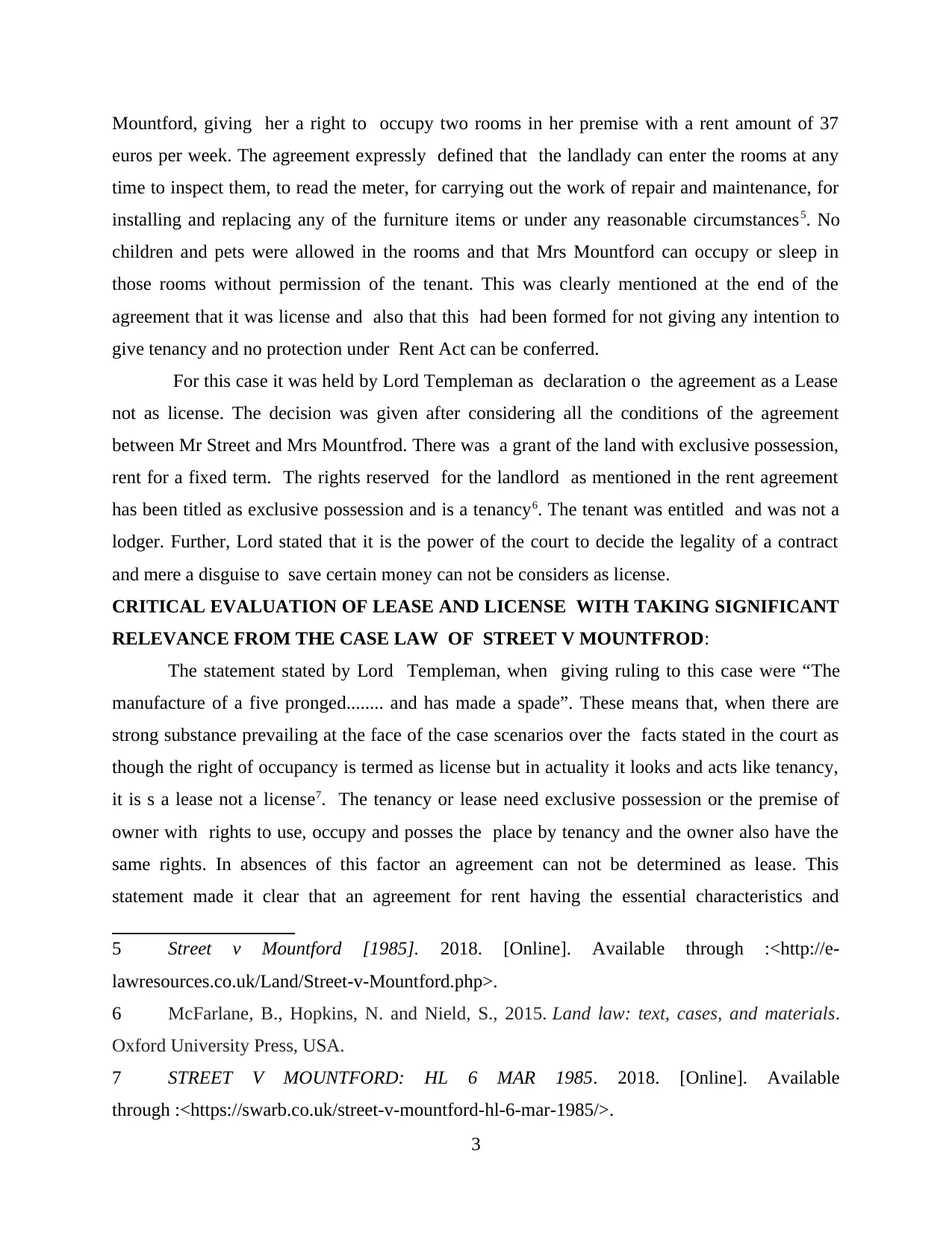
Mountford, giving her a right to occupy two rooms in her premise with a rent amount of 37
euros per week. The agreement expressly defined that the landlady can enter the rooms at any
time to inspect them, to read the meter, for carrying out the work of repair and maintenance, for
installing and replacing any of the furniture items or under any reasonable circumstances5. No
children and pets were allowed in the rooms and that Mrs Mountford can occupy or sleep in
those rooms without permission of the tenant. This was clearly mentioned at the end of the
agreement that it was license and also that this had been formed for not giving any intention to
give tenancy and no protection under Rent Act can be conferred.
For this case it was held by Lord Templeman as declaration o the agreement as a Lease
not as license. The decision was given after considering all the conditions of the agreement
between Mr Street and Mrs Mountfrod. There was a grant of the land with exclusive possession,
rent for a fixed term. The rights reserved for the landlord as mentioned in the rent agreement
has been titled as exclusive possession and is a tenancy6. The tenant was entitled and was not a
lodger. Further, Lord stated that it is the power of the court to decide the legality of a contract
and mere a disguise to save certain money can not be considers as license.
CRITICAL EVALUATION OF LEASE AND LICENSE WITH TAKING SIGNIFICANT
RELEVANCE FROM THE CASE LAW OF STREET V MOUNTFROD:
The statement stated by Lord Templeman, when giving ruling to this case were “The
manufacture of a five pronged........ and has made a spade”. These means that, when there are
strong substance prevailing at the face of the case scenarios over the facts stated in the court as
though the right of occupancy is termed as license but in actuality it looks and acts like tenancy,
it is s a lease not a license7. The tenancy or lease need exclusive possession or the premise of
owner with rights to use, occupy and posses the place by tenancy and the owner also have the
same rights. In absences of this factor an agreement can not be determined as lease. This
statement made it clear that an agreement for rent having the essential characteristics and
5 Street v Mountford [1985]. 2018. [Online]. Available through :<http://e-
lawresources.co.uk/Land/Street-v-Mountford.php>.
6 McFarlane, B., Hopkins, N. and Nield, S., 2015. Land law: text, cases, and materials.
Oxford University Press, USA.
7 STREET V MOUNTFORD: HL 6 MAR 1985. 2018. [Online]. Available
through :<https://swarb.co.uk/street-v-mountford-hl-6-mar-1985/>.
3
euros per week. The agreement expressly defined that the landlady can enter the rooms at any
time to inspect them, to read the meter, for carrying out the work of repair and maintenance, for
installing and replacing any of the furniture items or under any reasonable circumstances5. No
children and pets were allowed in the rooms and that Mrs Mountford can occupy or sleep in
those rooms without permission of the tenant. This was clearly mentioned at the end of the
agreement that it was license and also that this had been formed for not giving any intention to
give tenancy and no protection under Rent Act can be conferred.
For this case it was held by Lord Templeman as declaration o the agreement as a Lease
not as license. The decision was given after considering all the conditions of the agreement
between Mr Street and Mrs Mountfrod. There was a grant of the land with exclusive possession,
rent for a fixed term. The rights reserved for the landlord as mentioned in the rent agreement
has been titled as exclusive possession and is a tenancy6. The tenant was entitled and was not a
lodger. Further, Lord stated that it is the power of the court to decide the legality of a contract
and mere a disguise to save certain money can not be considers as license.
CRITICAL EVALUATION OF LEASE AND LICENSE WITH TAKING SIGNIFICANT
RELEVANCE FROM THE CASE LAW OF STREET V MOUNTFROD:
The statement stated by Lord Templeman, when giving ruling to this case were “The
manufacture of a five pronged........ and has made a spade”. These means that, when there are
strong substance prevailing at the face of the case scenarios over the facts stated in the court as
though the right of occupancy is termed as license but in actuality it looks and acts like tenancy,
it is s a lease not a license7. The tenancy or lease need exclusive possession or the premise of
owner with rights to use, occupy and posses the place by tenancy and the owner also have the
same rights. In absences of this factor an agreement can not be determined as lease. This
statement made it clear that an agreement for rent having the essential characteristics and
5 Street v Mountford [1985]. 2018. [Online]. Available through :<http://e-
lawresources.co.uk/Land/Street-v-Mountford.php>.
6 McFarlane, B., Hopkins, N. and Nield, S., 2015. Land law: text, cases, and materials.
Oxford University Press, USA.
7 STREET V MOUNTFORD: HL 6 MAR 1985. 2018. [Online]. Available
through :<https://swarb.co.uk/street-v-mountford-hl-6-mar-1985/>.
3
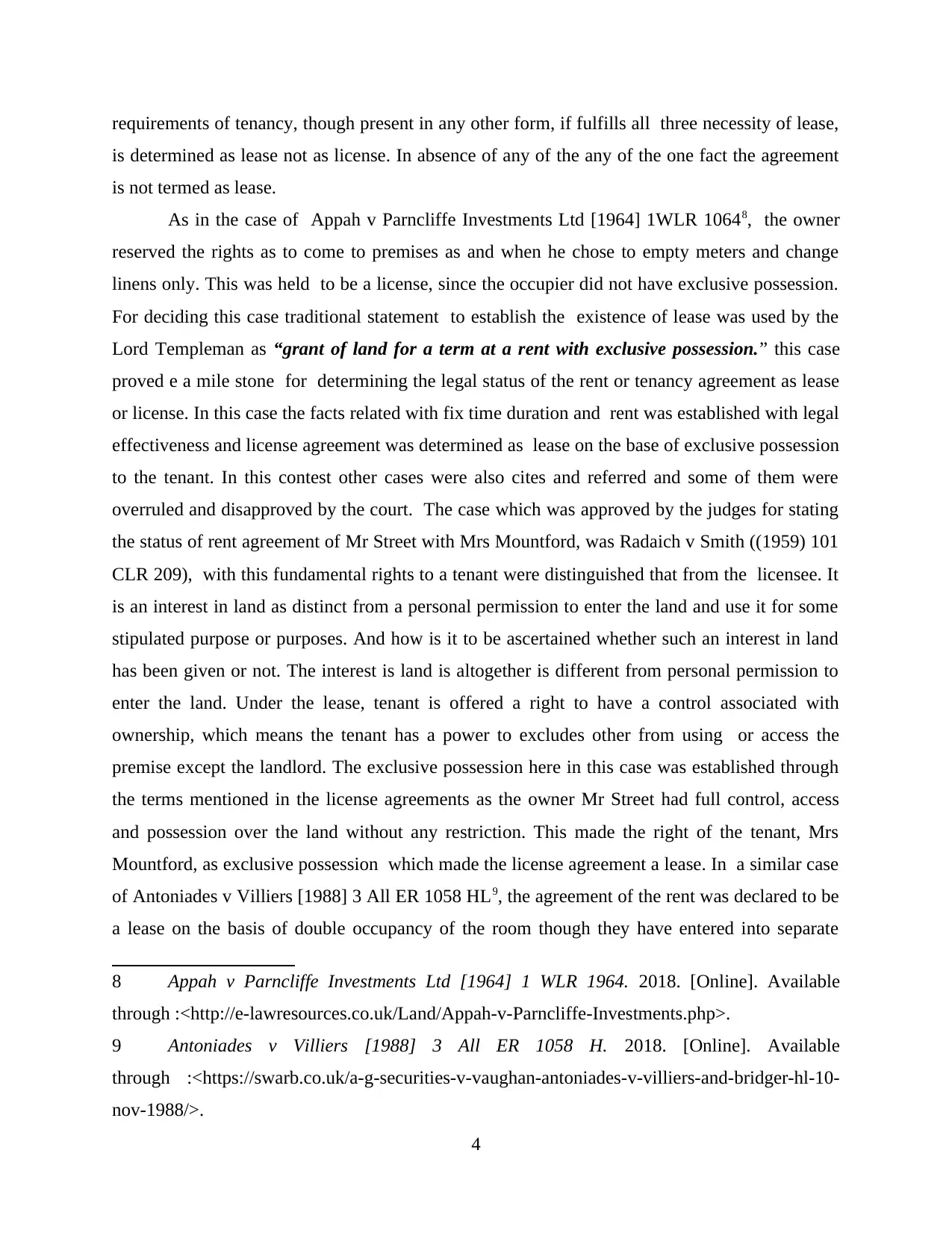
requirements of tenancy, though present in any other form, if fulfills all three necessity of lease,
is determined as lease not as license. In absence of any of the any of the one fact the agreement
is not termed as lease.
As in the case of Appah v Parncliffe Investments Ltd [1964] 1WLR 10648, the owner
reserved the rights as to come to premises as and when he chose to empty meters and change
linens only. This was held to be a license, since the occupier did not have exclusive possession.
For deciding this case traditional statement to establish the existence of lease was used by the
Lord Templeman as “grant of land for a term at a rent with exclusive possession.” this case
proved e a mile stone for determining the legal status of the rent or tenancy agreement as lease
or license. In this case the facts related with fix time duration and rent was established with legal
effectiveness and license agreement was determined as lease on the base of exclusive possession
to the tenant. In this contest other cases were also cites and referred and some of them were
overruled and disapproved by the court. The case which was approved by the judges for stating
the status of rent agreement of Mr Street with Mrs Mountford, was Radaich v Smith ((1959) 101
CLR 209), with this fundamental rights to a tenant were distinguished that from the licensee. It
is an interest in land as distinct from a personal permission to enter the land and use it for some
stipulated purpose or purposes. And how is it to be ascertained whether such an interest in land
has been given or not. The interest is land is altogether is different from personal permission to
enter the land. Under the lease, tenant is offered a right to have a control associated with
ownership, which means the tenant has a power to excludes other from using or access the
premise except the landlord. The exclusive possession here in this case was established through
the terms mentioned in the license agreements as the owner Mr Street had full control, access
and possession over the land without any restriction. This made the right of the tenant, Mrs
Mountford, as exclusive possession which made the license agreement a lease. In a similar case
of Antoniades v Villiers [1988] 3 All ER 1058 HL9, the agreement of the rent was declared to be
a lease on the basis of double occupancy of the room though they have entered into separate
8 Appah v Parncliffe Investments Ltd [1964] 1 WLR 1964. 2018. [Online]. Available
through :<http://e-lawresources.co.uk/Land/Appah-v-Parncliffe-Investments.php>.
9 Antoniades v Villiers [1988] 3 All ER 1058 H. 2018. [Online]. Available
through :<https://swarb.co.uk/a-g-securities-v-vaughan-antoniades-v-villiers-and-bridger-hl-10-
nov-1988/>.
4
is determined as lease not as license. In absence of any of the any of the one fact the agreement
is not termed as lease.
As in the case of Appah v Parncliffe Investments Ltd [1964] 1WLR 10648, the owner
reserved the rights as to come to premises as and when he chose to empty meters and change
linens only. This was held to be a license, since the occupier did not have exclusive possession.
For deciding this case traditional statement to establish the existence of lease was used by the
Lord Templeman as “grant of land for a term at a rent with exclusive possession.” this case
proved e a mile stone for determining the legal status of the rent or tenancy agreement as lease
or license. In this case the facts related with fix time duration and rent was established with legal
effectiveness and license agreement was determined as lease on the base of exclusive possession
to the tenant. In this contest other cases were also cites and referred and some of them were
overruled and disapproved by the court. The case which was approved by the judges for stating
the status of rent agreement of Mr Street with Mrs Mountford, was Radaich v Smith ((1959) 101
CLR 209), with this fundamental rights to a tenant were distinguished that from the licensee. It
is an interest in land as distinct from a personal permission to enter the land and use it for some
stipulated purpose or purposes. And how is it to be ascertained whether such an interest in land
has been given or not. The interest is land is altogether is different from personal permission to
enter the land. Under the lease, tenant is offered a right to have a control associated with
ownership, which means the tenant has a power to excludes other from using or access the
premise except the landlord. The exclusive possession here in this case was established through
the terms mentioned in the license agreements as the owner Mr Street had full control, access
and possession over the land without any restriction. This made the right of the tenant, Mrs
Mountford, as exclusive possession which made the license agreement a lease. In a similar case
of Antoniades v Villiers [1988] 3 All ER 1058 HL9, the agreement of the rent was declared to be
a lease on the basis of double occupancy of the room though they have entered into separate
8 Appah v Parncliffe Investments Ltd [1964] 1 WLR 1964. 2018. [Online]. Available
through :<http://e-lawresources.co.uk/Land/Appah-v-Parncliffe-Investments.php>.
9 Antoniades v Villiers [1988] 3 All ER 1058 H. 2018. [Online]. Available
through :<https://swarb.co.uk/a-g-securities-v-vaughan-antoniades-v-villiers-and-bridger-hl-10-
nov-1988/>.
4
⊘ This is a preview!⊘
Do you want full access?
Subscribe today to unlock all pages.

Trusted by 1+ million students worldwide
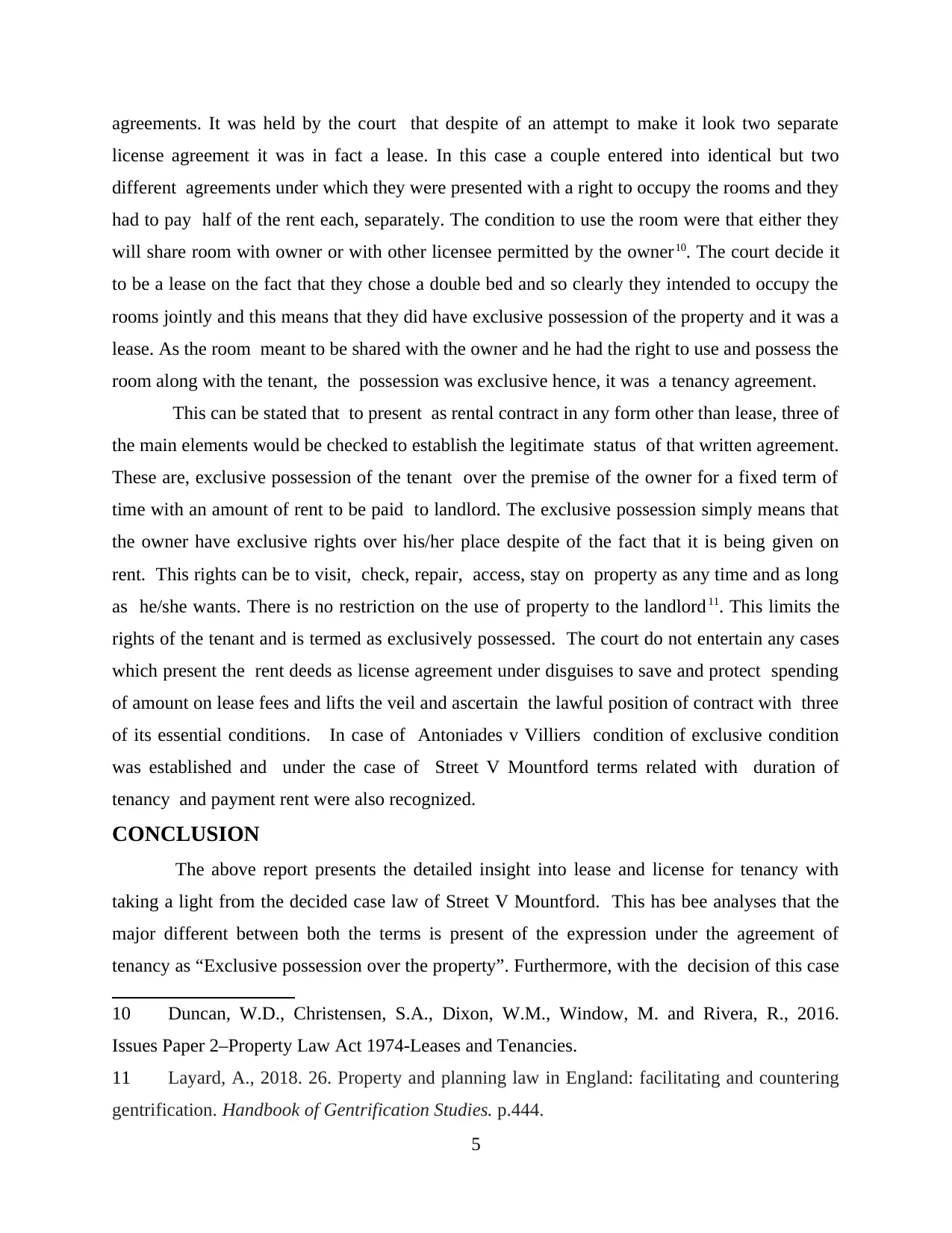
agreements. It was held by the court that despite of an attempt to make it look two separate
license agreement it was in fact a lease. In this case a couple entered into identical but two
different agreements under which they were presented with a right to occupy the rooms and they
had to pay half of the rent each, separately. The condition to use the room were that either they
will share room with owner or with other licensee permitted by the owner10. The court decide it
to be a lease on the fact that they chose a double bed and so clearly they intended to occupy the
rooms jointly and this means that they did have exclusive possession of the property and it was a
lease. As the room meant to be shared with the owner and he had the right to use and possess the
room along with the tenant, the possession was exclusive hence, it was a tenancy agreement.
This can be stated that to present as rental contract in any form other than lease, three of
the main elements would be checked to establish the legitimate status of that written agreement.
These are, exclusive possession of the tenant over the premise of the owner for a fixed term of
time with an amount of rent to be paid to landlord. The exclusive possession simply means that
the owner have exclusive rights over his/her place despite of the fact that it is being given on
rent. This rights can be to visit, check, repair, access, stay on property as any time and as long
as he/she wants. There is no restriction on the use of property to the landlord 11. This limits the
rights of the tenant and is termed as exclusively possessed. The court do not entertain any cases
which present the rent deeds as license agreement under disguises to save and protect spending
of amount on lease fees and lifts the veil and ascertain the lawful position of contract with three
of its essential conditions. In case of Antoniades v Villiers condition of exclusive condition
was established and under the case of Street V Mountford terms related with duration of
tenancy and payment rent were also recognized.
CONCLUSION
The above report presents the detailed insight into lease and license for tenancy with
taking a light from the decided case law of Street V Mountford. This has bee analyses that the
major different between both the terms is present of the expression under the agreement of
tenancy as “Exclusive possession over the property”. Furthermore, with the decision of this case
10 Duncan, W.D., Christensen, S.A., Dixon, W.M., Window, M. and Rivera, R., 2016.
Issues Paper 2–Property Law Act 1974-Leases and Tenancies.
11 Layard, A., 2018. 26. Property and planning law in England: facilitating and countering
gentrification. Handbook of Gentrification Studies. p.444.
5
license agreement it was in fact a lease. In this case a couple entered into identical but two
different agreements under which they were presented with a right to occupy the rooms and they
had to pay half of the rent each, separately. The condition to use the room were that either they
will share room with owner or with other licensee permitted by the owner10. The court decide it
to be a lease on the fact that they chose a double bed and so clearly they intended to occupy the
rooms jointly and this means that they did have exclusive possession of the property and it was a
lease. As the room meant to be shared with the owner and he had the right to use and possess the
room along with the tenant, the possession was exclusive hence, it was a tenancy agreement.
This can be stated that to present as rental contract in any form other than lease, three of
the main elements would be checked to establish the legitimate status of that written agreement.
These are, exclusive possession of the tenant over the premise of the owner for a fixed term of
time with an amount of rent to be paid to landlord. The exclusive possession simply means that
the owner have exclusive rights over his/her place despite of the fact that it is being given on
rent. This rights can be to visit, check, repair, access, stay on property as any time and as long
as he/she wants. There is no restriction on the use of property to the landlord 11. This limits the
rights of the tenant and is termed as exclusively possessed. The court do not entertain any cases
which present the rent deeds as license agreement under disguises to save and protect spending
of amount on lease fees and lifts the veil and ascertain the lawful position of contract with three
of its essential conditions. In case of Antoniades v Villiers condition of exclusive condition
was established and under the case of Street V Mountford terms related with duration of
tenancy and payment rent were also recognized.
CONCLUSION
The above report presents the detailed insight into lease and license for tenancy with
taking a light from the decided case law of Street V Mountford. This has bee analyses that the
major different between both the terms is present of the expression under the agreement of
tenancy as “Exclusive possession over the property”. Furthermore, with the decision of this case
10 Duncan, W.D., Christensen, S.A., Dixon, W.M., Window, M. and Rivera, R., 2016.
Issues Paper 2–Property Law Act 1974-Leases and Tenancies.
11 Layard, A., 2018. 26. Property and planning law in England: facilitating and countering
gentrification. Handbook of Gentrification Studies. p.444.
5
Paraphrase This Document
Need a fresh take? Get an instant paraphrase of this document with our AI Paraphraser

it has been identified that a lease agreement can bu put as mere license under disguise and court
has exclusive power to decide over the status of a contract of rent. This can be concluded for the
report that lease and license are different form each other as former one gives legal obligation
for a fix term instead the later one gives mere right to use the property.
6
has exclusive power to decide over the status of a contract of rent. This can be concluded for the
report that lease and license are different form each other as former one gives legal obligation
for a fix term instead the later one gives mere right to use the property.
6
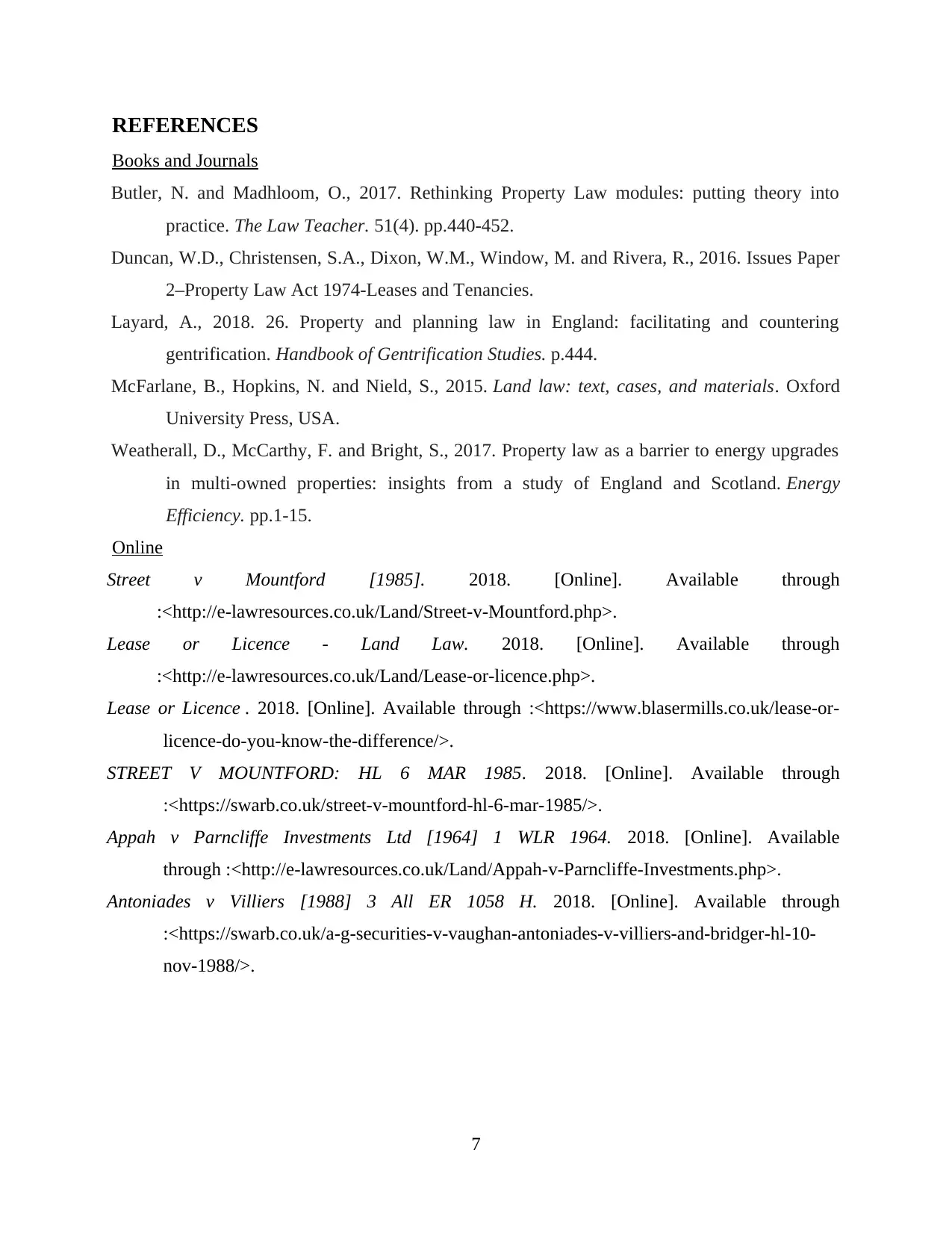
REFERENCES
Books and Journals
Butler, N. and Madhloom, O., 2017. Rethinking Property Law modules: putting theory into
practice. The Law Teacher. 51(4). pp.440-452.
Duncan, W.D., Christensen, S.A., Dixon, W.M., Window, M. and Rivera, R., 2016. Issues Paper
2–Property Law Act 1974-Leases and Tenancies.
Layard, A., 2018. 26. Property and planning law in England: facilitating and countering
gentrification. Handbook of Gentrification Studies. p.444.
McFarlane, B., Hopkins, N. and Nield, S., 2015. Land law: text, cases, and materials. Oxford
University Press, USA.
Weatherall, D., McCarthy, F. and Bright, S., 2017. Property law as a barrier to energy upgrades
in multi-owned properties: insights from a study of England and Scotland. Energy
Efficiency. pp.1-15.
Online
Street v Mountford [1985]. 2018. [Online]. Available through
:<http://e-lawresources.co.uk/Land/Street-v-Mountford.php>.
Lease or Licence - Land Law. 2018. [Online]. Available through
:<http://e-lawresources.co.uk/Land/Lease-or-licence.php>.
Lease or Licence . 2018. [Online]. Available through :<https://www.blasermills.co.uk/lease-or-
licence-do-you-know-the-difference/>.
STREET V MOUNTFORD: HL 6 MAR 1985. 2018. [Online]. Available through
:<https://swarb.co.uk/street-v-mountford-hl-6-mar-1985/>.
Appah v Parncliffe Investments Ltd [1964] 1 WLR 1964. 2018. [Online]. Available
through :<http://e-lawresources.co.uk/Land/Appah-v-Parncliffe-Investments.php>.
Antoniades v Villiers [1988] 3 All ER 1058 H. 2018. [Online]. Available through
:<https://swarb.co.uk/a-g-securities-v-vaughan-antoniades-v-villiers-and-bridger-hl-10-
nov-1988/>.
7
Books and Journals
Butler, N. and Madhloom, O., 2017. Rethinking Property Law modules: putting theory into
practice. The Law Teacher. 51(4). pp.440-452.
Duncan, W.D., Christensen, S.A., Dixon, W.M., Window, M. and Rivera, R., 2016. Issues Paper
2–Property Law Act 1974-Leases and Tenancies.
Layard, A., 2018. 26. Property and planning law in England: facilitating and countering
gentrification. Handbook of Gentrification Studies. p.444.
McFarlane, B., Hopkins, N. and Nield, S., 2015. Land law: text, cases, and materials. Oxford
University Press, USA.
Weatherall, D., McCarthy, F. and Bright, S., 2017. Property law as a barrier to energy upgrades
in multi-owned properties: insights from a study of England and Scotland. Energy
Efficiency. pp.1-15.
Online
Street v Mountford [1985]. 2018. [Online]. Available through
:<http://e-lawresources.co.uk/Land/Street-v-Mountford.php>.
Lease or Licence - Land Law. 2018. [Online]. Available through
:<http://e-lawresources.co.uk/Land/Lease-or-licence.php>.
Lease or Licence . 2018. [Online]. Available through :<https://www.blasermills.co.uk/lease-or-
licence-do-you-know-the-difference/>.
STREET V MOUNTFORD: HL 6 MAR 1985. 2018. [Online]. Available through
:<https://swarb.co.uk/street-v-mountford-hl-6-mar-1985/>.
Appah v Parncliffe Investments Ltd [1964] 1 WLR 1964. 2018. [Online]. Available
through :<http://e-lawresources.co.uk/Land/Appah-v-Parncliffe-Investments.php>.
Antoniades v Villiers [1988] 3 All ER 1058 H. 2018. [Online]. Available through
:<https://swarb.co.uk/a-g-securities-v-vaughan-antoniades-v-villiers-and-bridger-hl-10-
nov-1988/>.
7
⊘ This is a preview!⊘
Do you want full access?
Subscribe today to unlock all pages.

Trusted by 1+ million students worldwide

BIBLIOGRAPHY
http://e-lawresources.co.uk/Land/Street-v-Mountford.php
http://e-lawresources.co.uk/Land/Street-v-Mountford.php
http://e-lawresources.co.uk/Land/Requirements-of-a-lease.php
http://e-lawresources.co.uk/Land/Land-law.php
https://hklandlaw.wordpress.com/2013/03/21/street-v-mountford/
https://www.blasermills.co.uk/lease-or-licence-do-you-know-the-difference/
http://wps.pearsoned.co.uk/
ema_uk_he_lawexpqa17_duddington_land_4/253/64884/16610319.cw/content/index.html
https://swarb.co.uk/street-v-mountford-hl-6-mar-1985/
https://www.lexology.com/library/detail.aspx?g=716412fd-c149-47b7-b1dd-c30d19a1a5e7
http://e-lawresources.co.uk/Land/Street-v-Mountford.php
http://e-lawresources.co.uk/Land/Street-v-Mountford.php
http://e-lawresources.co.uk/Land/Requirements-of-a-lease.php
http://e-lawresources.co.uk/Land/Land-law.php
https://hklandlaw.wordpress.com/2013/03/21/street-v-mountford/
https://www.blasermills.co.uk/lease-or-licence-do-you-know-the-difference/
http://wps.pearsoned.co.uk/
ema_uk_he_lawexpqa17_duddington_land_4/253/64884/16610319.cw/content/index.html
https://swarb.co.uk/street-v-mountford-hl-6-mar-1985/
https://www.lexology.com/library/detail.aspx?g=716412fd-c149-47b7-b1dd-c30d19a1a5e7
1 out of 10
Related Documents
Your All-in-One AI-Powered Toolkit for Academic Success.
+13062052269
info@desklib.com
Available 24*7 on WhatsApp / Email
![[object Object]](/_next/static/media/star-bottom.7253800d.svg)
Unlock your academic potential
Copyright © 2020–2026 A2Z Services. All Rights Reserved. Developed and managed by ZUCOL.





